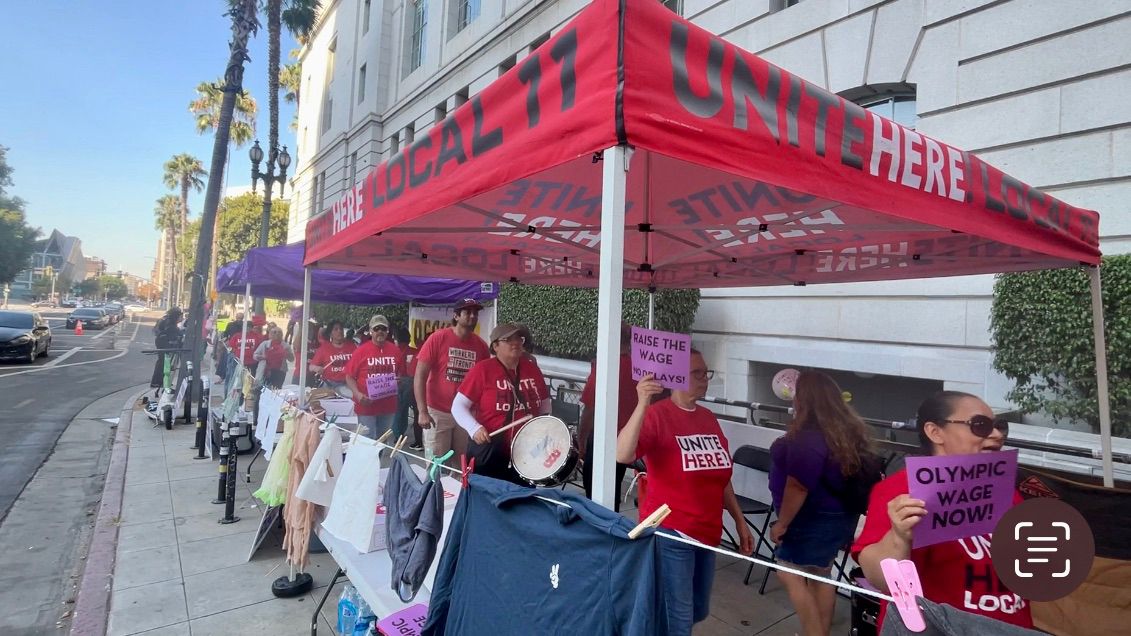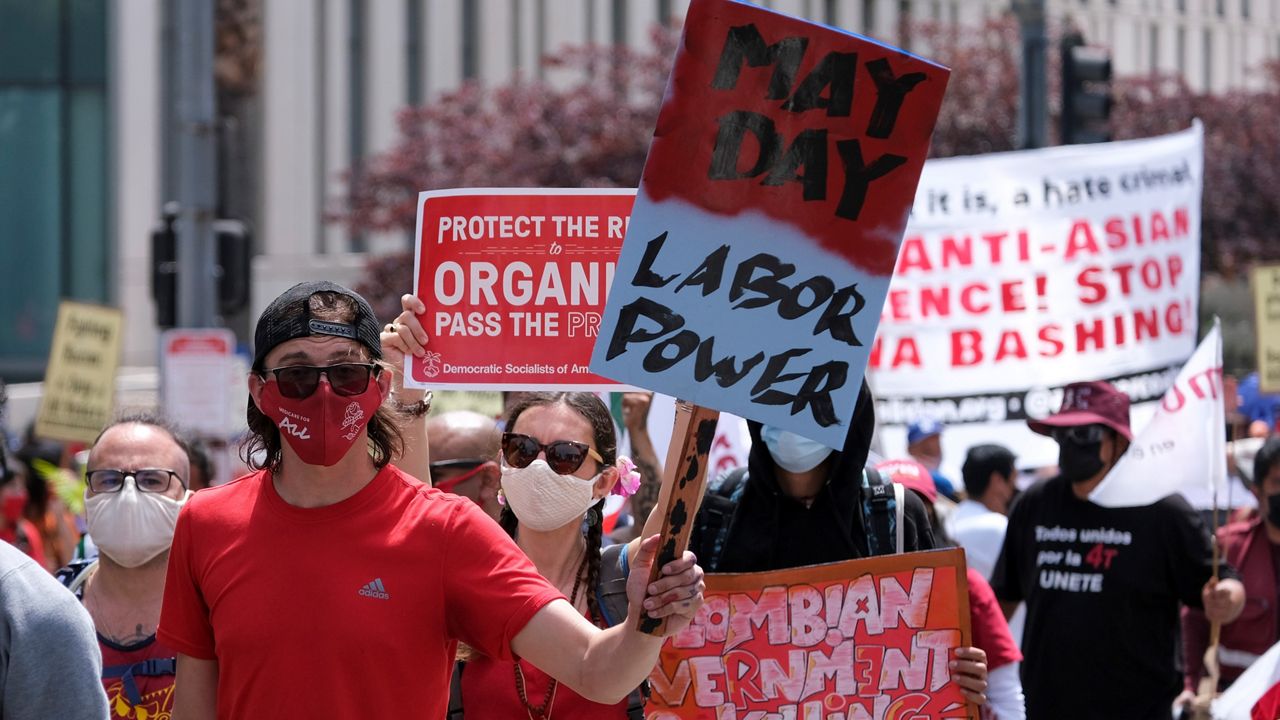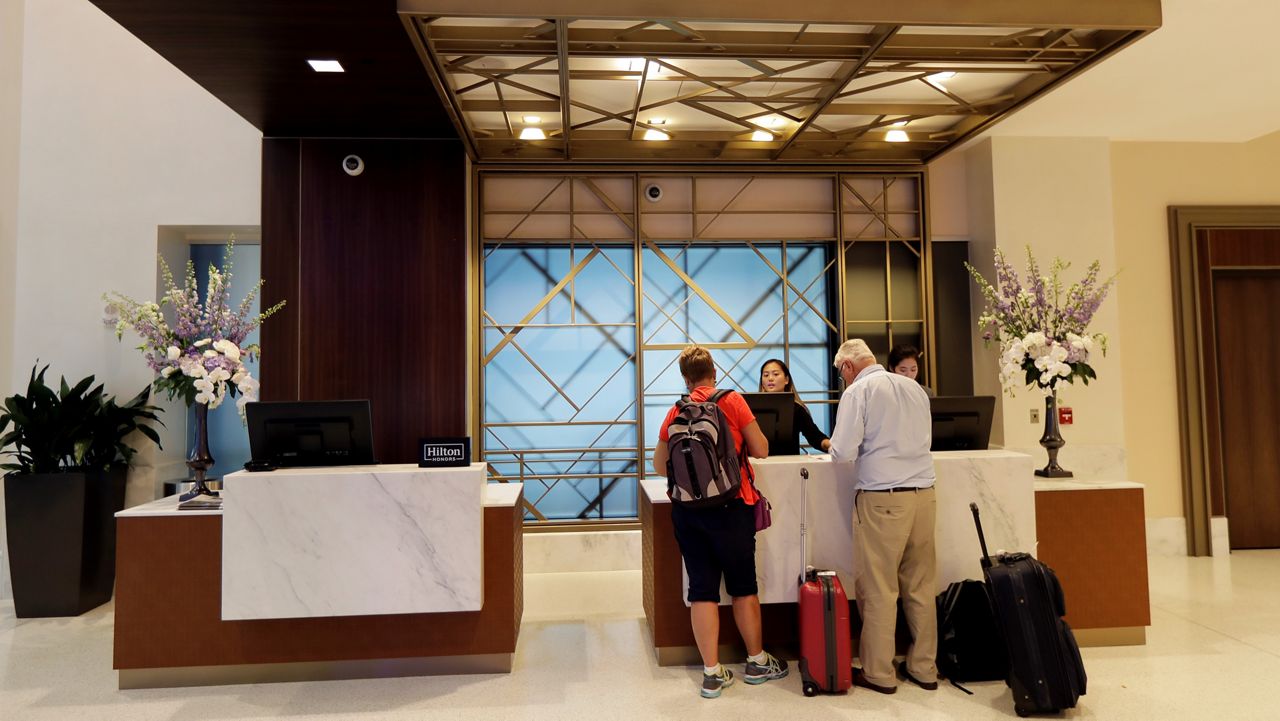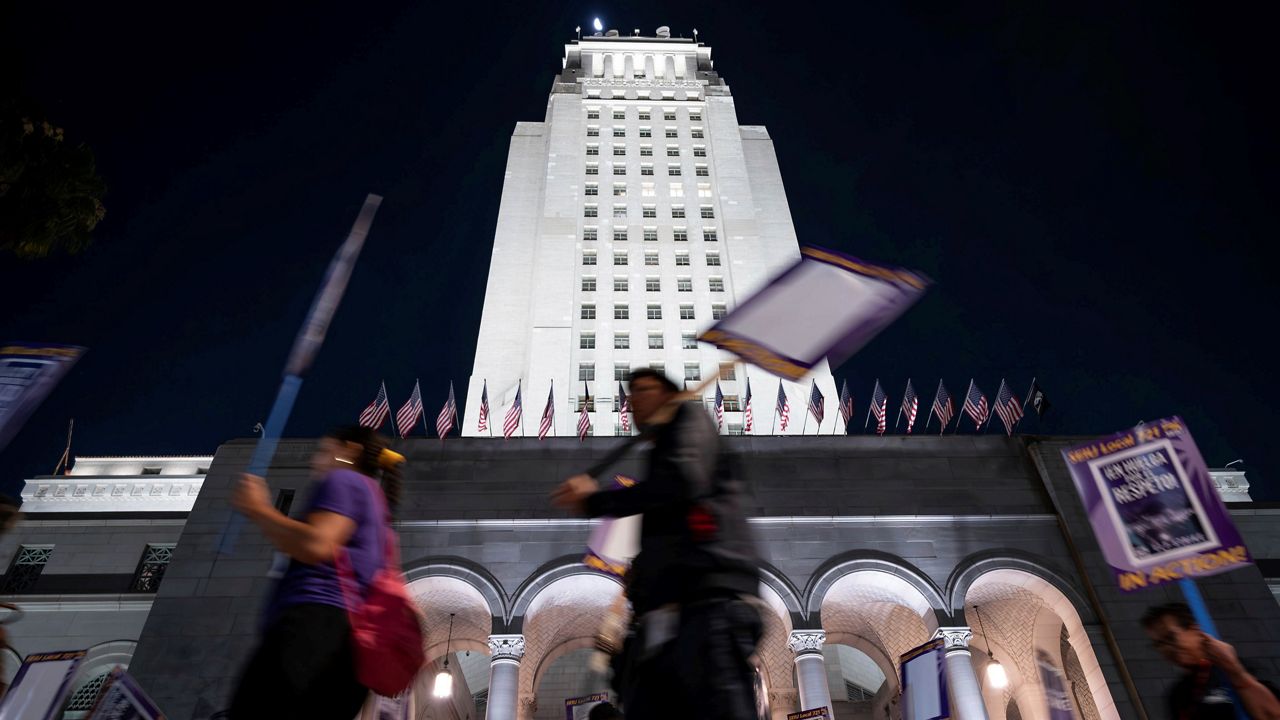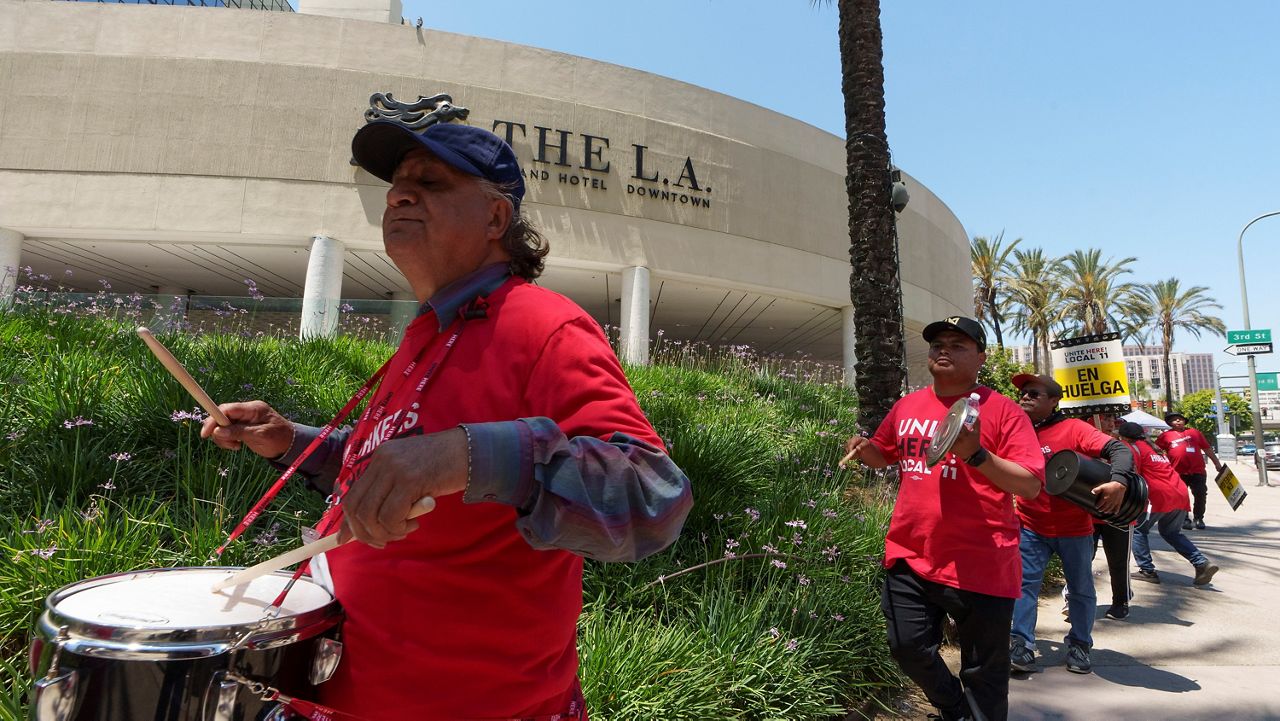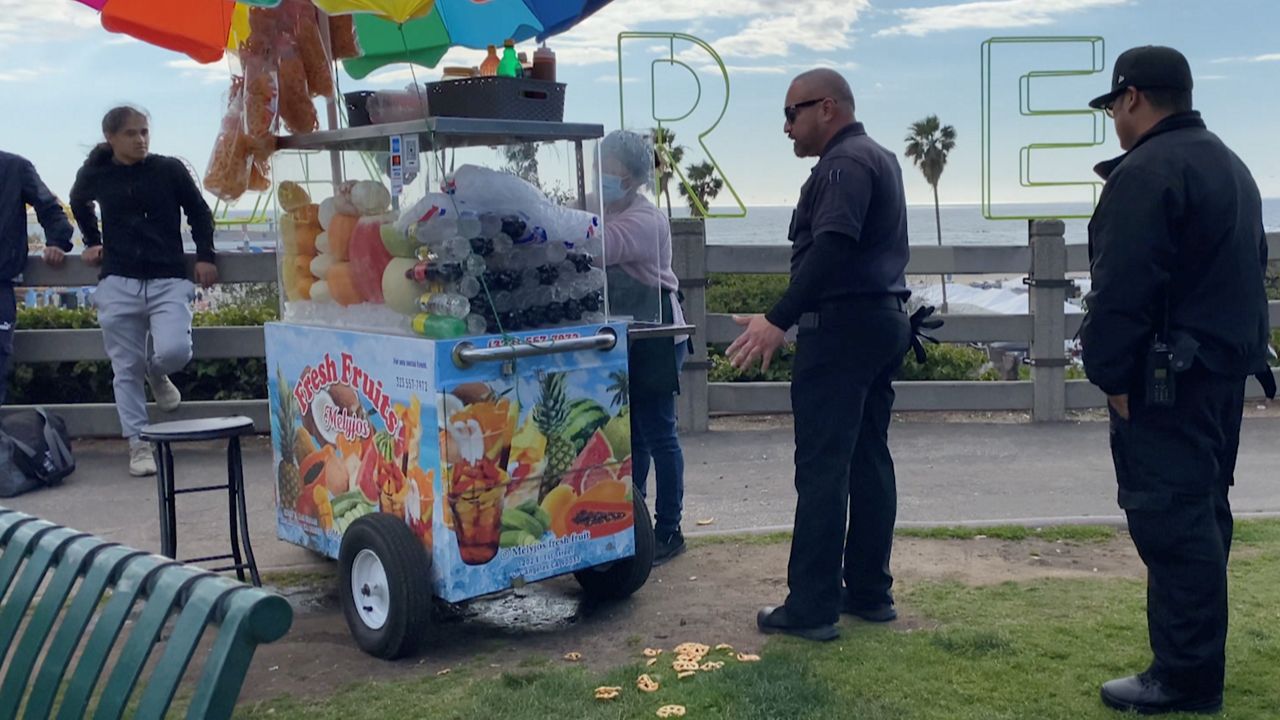LOS ANGELES — Dozens of tourism workers rallied at City Hall Tuesday, urging Mayor Karen Bass and City Council members to increase the minimum wage and bolster health care benefits through two ordinances as Los Angeles gears up to host global events.
Cooks, room attendants, dishwashers and airport workers represented by Unite Here Local 11 and SEIU-USWW, and other groups, "occupied" a portion of the sidewalk outside City Hall in their bid for better compensation. The workers' action comes on the heels of a report released by the chief legislative analyst that supported such wage increases. The report concluded the policy would "significantly improve equity of both compensation and benefits for workers in the targeted sectors."
The report is expected to be discussed by the council's Trade, Travel and Tourism Committee at a future date.
Lisandro Preza, a cashier represented by Unite Here Local 11, and Javon Houston, a customer service agent represented by SEIU-USWW, told City News Service that tourism workers deserve higher wages and that many of them are struggling to afford basic expenses. Preza and Houston, who both work at LAX, said some of their coworkers even sleep in their cars in the parking lots.
"I am lucky that my partner helps me, my family helps me, but there are other people that don't get any help," Preza said. "The only problem I have right now is that it's hard to pay for my medication because the pay is so low. With my family's help, I can make it. But it's stressful every month."
Preza, who is HIV positive, said he needs two shots a month to maintain his health.
Houston hopes city leaders will soon take action and approve higher wages. She added, "They can afford our wages and they can afford our health care. So let's get on with the ball and get it rolling."
While they describe these higher wages as an "Olympic wage," alluding to the 2028 LA Olympic and Paralympic Games, Preza said there will be other global events coming much sooner, such as the FIFA World Cup in 2026.
"We are the faces that passengers will see when they come through LAX," Preza said. "If you go to LAX right now, you'll see a lot of tired faces. Some people have three jobs just to get by because they cannot to afford to live here in LA"
Pastor Matthew Wait of the First Lutheran Church in Culver City and Palms, a member of Clergy and Laity United for Economic Justice, who attended the rally, said tourism workers in LA are facing impossible choices.
"City Hall has a moral responsibility to raise the minimum wage so that these families aren't facing impossible decisions," Wait told City News Service.
About 50 tourism workers entered Council Chambers to address council members directly during public comment. They shared stories about their lives and working conditions to encourage the City Council to take action.
In May 2023, the City Council called for an economic analysis of proposed revisions to the Living Wage and Hotel Worker Minimum Wage ordinances. The city later contracted Berkeley Economic Advising and Research to conduct the study.
While the LWO applies to city contractors and ensures that employees are paid a set living wage, setting a cash wage rate and health-related benefits, the other ordinance requires hotel employers with 60 or more guest rooms to pay their employees a minimum wage and provide 96 compensated hours of off time, and at least 80 additional hours of uncompensated time off per year.
Council members originally sought to increase the minimum wage under the two ordinances to $25 an hour by 2023, but no action has been taken as they waited for the study to be complete. The analysis also provides an alternative wage rate so that the minimum wage reaches $30 an hour by 2028.
In her report, Chief Legislative Analyst Sharon Tso proposed that the city revise the two ordinances to boost hourly wages to $24.40, and provide a health care benefit payment of $7.51 per hour and $8.35 for airport and hotel workers, respectively. Wages would then increase on a yearly basis through 2028 until reaching $30 an hour.
Currently, airport and hotel workers earn $18.78 per hour and $19.73 per hour, respectively. Airport workers earn a health care payment of $5.95 per hour, while hotel workers do not, according to Tso's report.
Additionally, Tso proposed the city adopt what is known as a "Public Housekeeping Training Program," similar to what Santa Monica has in place to inform hotel workers or immigrant low-wage workers about their rights, among other things.
This proposal has raised some concern among hotel owners, and others, such as the Asian American Hotel Owners Association.
"Our members in Los Angeles are dedicated to providing competitive wages that reflect the area's cost of living and market conditions," Laura lee Blake, president and CEO of AAHOA, told City News Service in an email in June.
"However, the ability to offer significant wage increases varies across different properties and is influenced by factors such as occupancy rates, operational costs and contractual obligations."
Lee cited, for example, that studies show that some 9,500 jobs were lost in California after the mandated wage increase for restaurants to $20 per hour. She added, "We encourage a collaborative approach where hotel owners, employees, and local officials work together to find mutually beneficial solutions."
In 2014, AAHOA partnered with the American Hotel & Lodging Association on a study, called "Extreme Wage Initiatives and the Hotel Industry: Impact on Local Communities and the Nation." A key focus of that study, conducted 10 years ago, was a proposal in Los Angeles to increase the local wage for hotel workers to $15.37 per hour.
At the time, the study found the implementation of that increase could result in:
- A total job loss of 1,394 hotel staff positions;
- A loss of $106.1 million in annual guest room revenue;
- $16.4 million in lost hotel occupancy taxes;
- $2.9 million in lower corporate taxes; and
- A loss of $20.1 million in hotel values.
Lee noted that the data was pre-pandemic, and the labor market has shifted greatly.
"Wages have only increased, and therefore, the impacts on job losses, annual guest room revenue, taxes, and hotel values would be significantly greater than a decade ago," Lee wrote in her email.
While she recognized major events will present an opportunity for economic growth, Lee warned that such benefits may not necessarily be distributed uniformly across all hotels.
"With careful planning and cooperation, the economic boost could positively enhance wages and employee benefits on a property-by-property basis, and many AAHOA members would strive to share the same with their employees who are seeking to ensure an excellent guest experience for the many visitors to the city," Lee said in the email.







